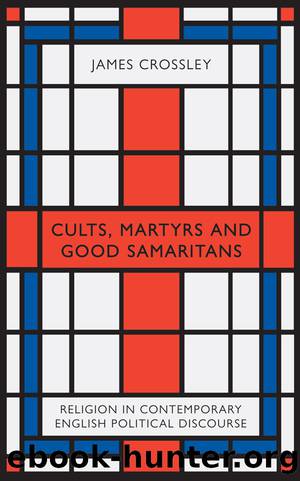Cults, Martyrs and Good Samaritans by Crossley James;

Author:Crossley, James;
Language: eng
Format: epub
Publisher: Pluto Press
Not (always) doing God
What can we say about such Barrovian understandings of Christianity and the Bible? Whenever an obvious reference to the Bible turned up (e.g., âHard work? What, thou shalt work hard?â, âDavid and Goliathâ, âscapegoatâ, âscales fell from his eyesâ) it held a low-level nostalgic power with an ironic distance from what was an occasional cultural resource, much like Furness Abbey but probably not as popular. In this sense, they were minor examples of David Crystalâs argument about the cultural survival of the language of the Bible (partly) through a witty use of idioms and a draining of anything perceived to be too âreligiousâ (Crystal was referring to the language of the King James Bible but the point stands).36 This, as I have argued elsewhere, is evidence of an understanding of the Bible without context or content, deprived of any malignant properties as it continues to survive (and only just in this sample from Barrow) in Western cultural contexts, striving to come to terms with secularism, nationalism and global capitalism.37 As a physical cultural artefact in a place like Barrow, the Bible was most likely to be received as a gift at christenings (one of the rare occasions where the Bible and Christianity might openly feature in public life) before being consigned to a life of gathering dust on the shelf.
As Barrovian sentiments revealed different subjective class assumptions so they revealed a blunt disjunction between a quasi-official Bible of the ruling class (or at least its politically authoritative interpreters) and the Barrovian sample (recall sentiments such as âa load of bollocksâ, âbullshittingâ, âabsolute bullshitâ, âstupidâ, âwhat?â, âeh?â, âhe said that?â, âdebateableâ, âI donât think he knows what he is talking aboutâ, âhypocriteâ, âdo they really relate that to the Bible?â), with all the accompanying puzzled looks, laughs, and untypically long pauses. One Leave voter who clearly had no such sentimental attachment to Christianity and the Bible, asked (as did others) whether Cameron got âa lot of hassle for that?â. With such examples in mind, which appeared to be in line with national trends, Alastair Campbellâs fears may not have been unfounded when he shut down an interview with Tony Blair using the famous phrase, âwe donât do Godâ. The British electorate, he also claimed, do not âwant their politicians banging the Bible all the time. They hated it, I was sure of that.â38 It might be an understatement to claim that Campbellâs view would resonate among at least some of the Barrovian electorate. As one Remain voter put it, she did not âappreciate politicians using religion to sell us somethingâ.
Such views would not, therefore, have been restricted to Barrow and they would have resonated well beyond. An important point of comparison here is Matthew Engelkeâs ethnography of the Bible Society between 2006 and 2009 with reference to Swindon and Greater Manchester. As he showed, the Bible Society, who were well read in academic literature on religious affiliation and beliefs in the UK, increasingly viewed the problem of âcredibilityâ in promoting an ever-more marginalised Bible from the 1990s onward.
Download
This site does not store any files on its server. We only index and link to content provided by other sites. Please contact the content providers to delete copyright contents if any and email us, we'll remove relevant links or contents immediately.
| Africa | Americas |
| Arctic & Antarctica | Asia |
| Australia & Oceania | Europe |
| Middle East | Russia |
| United States | World |
| Ancient Civilizations | Military |
| Historical Study & Educational Resources |
Cecilia; Or, Memoirs of an Heiress — Volume 1 by Fanny Burney(32062)
Cecilia; Or, Memoirs of an Heiress — Volume 3 by Fanny Burney(31458)
Cecilia; Or, Memoirs of an Heiress — Volume 2 by Fanny Burney(31409)
The Secret History by Donna Tartt(18163)
Sapiens: A Brief History of Humankind by Yuval Noah Harari(13991)
Leonardo da Vinci by Walter Isaacson(12804)
The Radium Girls by Kate Moore(11621)
Sapiens by Yuval Noah Harari(5123)
How Democracies Die by Steven Levitsky & Daniel Ziblatt(4958)
The Wind in My Hair by Masih Alinejad(4843)
Homo Deus: A Brief History of Tomorrow by Yuval Noah Harari(4690)
Endurance: Shackleton's Incredible Voyage by Alfred Lansing(4507)
Man's Search for Meaning by Viktor Frankl(4275)
The Silk Roads by Peter Frankopan(4274)
Millionaire: The Philanderer, Gambler, and Duelist Who Invented Modern Finance by Janet Gleeson(4099)
The Rape of Nanking by Iris Chang(4023)
Hitler in Los Angeles by Steven J. Ross(3798)
The Motorcycle Diaries by Ernesto Che Guevara(3787)
Joan of Arc by Mary Gordon(3783)
